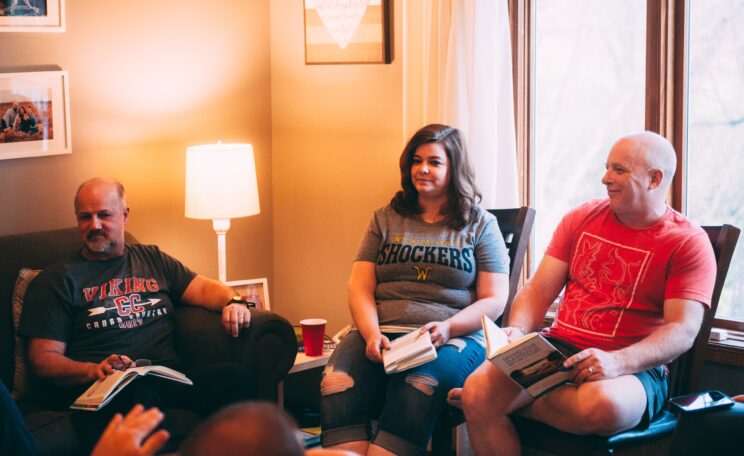
Book discussion groups are popular in Christian graduate and faculty groups. While they don’t replace studying The Book, many are already studying the Bible with another group, perhaps in their church. Book discussion groups afford the opportunity to explore a book in which there is shared interest. Sometimes that could focus on spiritual disciplines and growth, Christian belief, or Christian history. It might focus on a contemporary issue like racism or the environment or living sustainably. Or you might just read an important novel or perhaps a work around an issue in academia. Whatever the case, the aim is to grow in “whole mind and life discipleship” in the company of others.
For the past several years, InterVarsity’s Graduate and Faculty Ministry has received grant funding that has supported book groups on over fifty campuses throughout the US. In the process, we’ve learned a great deal about what makes for great book discussions. Here are some of the things we’ve learned that make for great groups:
Setting. The best setting is an informal one, like an apartment or home, with a meal. People bond over food and the chance for spontaneous, informal conversation carries over into book discussions. If people take turns bringing food or all chip it, it increases ownership. However bringing food should never be a barrier. Informal settings often allow the chance to go longer than an hour, often the maximum for conference rooms or online calls. This allows for sharing food and unhurried discussions. But that’s not always possible. Meeting over a brown bag lunch, at a restaurant, or online can work well if the facilitator has prepared well. Always end on time!
Facilitator(s). A good facilitator prepares by reading the selection carefully. They think through the flow of the discussion including warm up, opening and discussion questions and plan for time of personal reponse and prayer. They pay attention to what is being discussed and how people are responding. If someone is dominating, they may gently break in and ask,”Let’s hear what some others think.” They may open with a question like “what was particularly enlightening or challenging in this week’s reading?” Often, three or four good questions are more than adequate. Many books even include discussion guides. Facilitators pace the discussion to allow time for wrapup, including identifying the unresolved issues to which the group might return, and to allow time for personal reflection, journaling, and prayer in response. Shared leadership is great for ownership if each leader agrees to prepare well.
Book and Schedule. The best books for grad and faculty book groups are ones that are both intellectually engaging and that they will actually read. Often, a barrier to attendance is that people don’t get the reading done ahead. Groups generally should plan 6 to 10 meetings and assign readings of around 15-20 pages. Some groups go a step further and build in time to read the selection for the evening (or a key portion) at the meeting. Generally, this means choosing books between 120 and 200 pages in length. Reminder emails a day before with the reading, location (or online link), and time never hurt. If your group is considering a book that is too long, dense, or “fluffy” it’s better to raise this rather than suffer through discussions that turn people off to book groups.
Group size and composition. Like most small groups, 6 to 10 people is optimum for good discussion without people getting lost. If things get larger, you might eat together and break into smaller groups (or online breakout rooms) for part or all of the discussion. Allowing time to hear a summary from each group can be helpful. Diverse groups by discipline, gender, and ethnicity can be fun and sometimes challenging for the diversity of perspective. When there are differences, the “listen and summarize what the other has said to their satisfaction before responding” rule can be helpful.
Discussions. Lively discussions in the grad and faculty context include room for questions, critique of the book under dicussion and disageeing with ideas, but not with people with whom we agree in Christ. Good discussion facilitators rein in rabbit trails and off-topic tangents. Sometimes, it helps to say, “great topic for discussion, but not related to this book.” Facilitators should watch the pace. Rather than flog something to death, it doesn’t hurt to leave people wanting more.
Be Creative! Consider breaking up your meetings with change of pace activities related to the book. It could be a movie or art exhibition related to the book theme. If it is a book on spiritual formation, plan a retreat together that incorporates spiritual practices. Attend a lecture or interview an expert on the topic you are discussing. Consider setting up an online call with the author of the book–if you contact the publisher, they will often help you do this. Depending on the demands the author faces, he or she might be very glad to talk with engaged readers. If it is a book that gives a call to action, find a way to respond locally as a group.
Have you read something good that you wish you could discuss with others? Or have you seen a book you’d like to discuss? Why not talk to friends about joining up with you? Now is not a bad time to plan for next term, given how schedules can fill up. Or plan for summer when schedules may be looser.
We’d love to hear in comments about your book group experiences. Let us know what we haven’t covered or would be more helpful.
Bob Trube is Associate Director of Faculty Ministry and Director of the Emerging Scholars Network. He blogs on books regularly at bobonbooks.com. He resides in Columbus, Ohio, with Marilyn and enjoys reading, gardening, choral singing, and plein air painting.

Leave a Reply